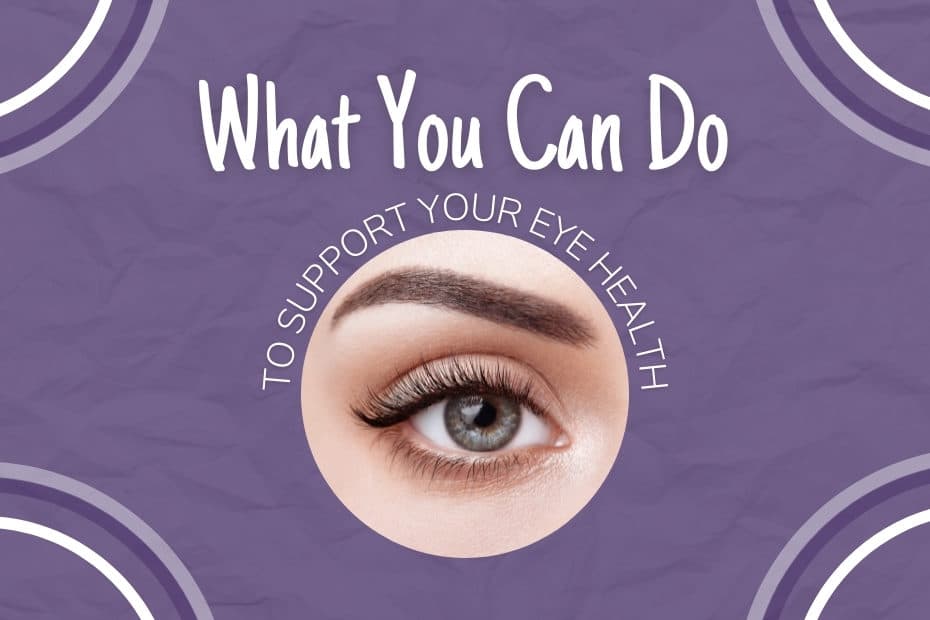When we talk about our overall health, our eyes don’t always get the attention they deserve – but it’s crucial that we take excellent care of them! Here’s what you can do to support your eye health.
A lot of us take our eyes for granted, but healthy eyes are crucial for us to perform at our very best! Taking the steps to ensure our eyes are protected and healthy is essential, as this helps decrease the risk of vision loss and other eye conditions. Here are some of the habits and lifestyle changes you can implement to ensure you’re giving your eyes the attention that they deserve.
Keep Up with Your Regular Eye Exam

First things first: you need to make sure you’re regularly getting your eyes checked out by an eye doctor! It’s easy to skip eye exams, especially if you don’t have any prescriptions to renew or issues with your eyes. However, even if everything seems fine, it’s important to regularly see an eye doctor for an exam to ensure your eye health is at its best.
The eyes can tell you a lot about your health in general, and a medical professional can spot early signs of potential eye issues so that you can deal with them before they progress.
A general rule of thumb is to get an exam every one to two years – your eye doctor can advise you on whether to see them more or less often based on your needs.
Consume Nutrients that Support Eye Health

Certain nutrients play a vital role in supporting eye function and overall health. Here are some of the nutrients that support your eyes:
- Vitamin A: A vitamin A deficiency can lead to a variety of health issues with your eyes, including dry eyes and night blindness. Make sure your diet is rich in vitamin A and carotenoids (which are converted into vitamin A in the body). These nutrients can be found in foods like eggs, dairy products, kale, spinach, sweet potatoes, and carrots.
- Vitamins C & E: These antioxidant-rich vitamins can help fight free radicals, which could cause damage to the eyes. Research has shown that vitamin E and vitamin C may help reduce your risk of age-related cataracts. Some foods rich in vitamin E include almonds, sunflower seeds, salmon, and avocado, while foods with vitamin C include citrus fruits, acerola cherries, yellow bell peppers, and kale.
- Melatonin: This natural sleep aid can play a major role in your eye health. Melatonin is high in antioxidants, and research has shown that it may help protect the retina and fight age-related eye damage. Want to support your eyes while also promoting an amazing night’s sleep? Try our new Super Sleep Melatonin Gummies! Take one of these berry-flavored vegan gummies before bed to wind down and get the best sleep ever.
Give Your Eyes a Screen Break

We’re spending more and more time in front of screens – and it’s not doing any favors for our eye health! Too much screen time can lead to a variety of eye issues, including strain, blurry vision, and dry eyes.
In order to counteract the effects that the screen has on our eyes, get in the habit of giving your eyes a rest. If you’re working at your computer or otherwise staring at a screen for an extended period of time, every 20 minutes, look away from the screen for at least 20 seconds. This will help give your eyes a little reset. It’s also a good idea to give yourself a longer screen break every two hours or so. Step away from your computer and enjoy a well-deserved break!
Wear Sunglasses

When you’re outside, it’s important to wear sunglasses – specifically UVA and UVB blocking sunglasses – to protect the eyes. UV exposure can cause retinal damage, and increases the risk of cataracts and macular degeneration. Be on the lookout for a pair that blocks out 99% to 100% of UVA and UVB rays, as this will give you the most protection.
Want to get the best sleep of your life and support your eye health? Try our new Super Sleep Melatonin Gummies!

If you want more health, wellness, and lifestyle tips, click here to check out our blog!
